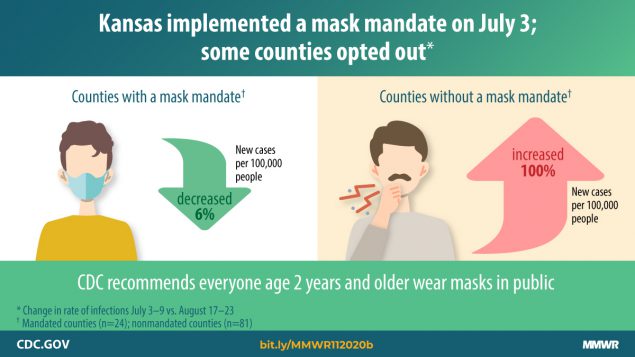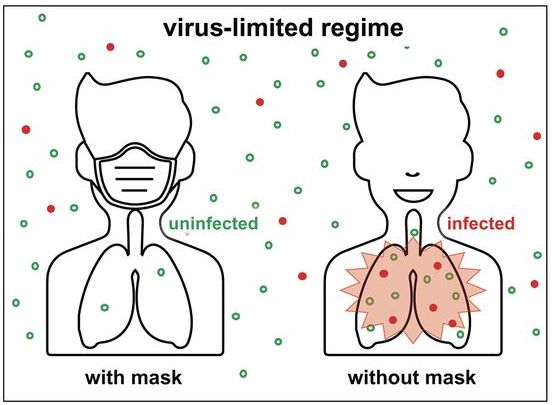"Our results suggest that information dissemination about COVID-19, which causes individual adoption of handwashing, mask-wearing, and social distancing, can be an effective strategy to mitigate and delay the epidemic."

"The governor of Kansas issued an executive order requiring wearing masks in public spaces, effective July 3, 2020, which was subject to county authority to opt out. After July 3, COVID-19 incidence decreased in 24 counties with mask mandates but continued to increase in 81 counties without mask mandates."
A face shield alone is not enough!
A Lancet (top medical journal) meta study of 172 other studies concluded:
"Face mask use could result in a large reduction in risk of infection".
The American Journal of Tropical Medicine and Hygiene
"this study demonstrates that the FFEs of consumer-grade masks available to the public are, in many cases, nearly equivalent to or better than their non-N95 respirator medical mask counterparts."
"Face mask use by the primary case and family contacts before the primary case developed symptoms was 79% effective in reducing transmission"
BUT
"Wearing a mask after illness onset of the primary case was not significantly protective." !!!
Physics of Fluids.
- Claverie JM Why We Should Wear Masks (Even Handcrafted Ones) Virologie (Montrouge). 2020 Apr 1;24(2):22.doi: 10.1684/vir.2020.0833. PMID: 32540824 French version
- Claverie JM Why we should wear masks (even handcrafted ones). Virologie (Montrouge). 2020 Apr 1;24(2):78. English doi: 10.1684/vir.2020.0832. PMID: 32540829 English version

American Journal of Preventive Medicine
2021 November 10, Results:
... Average COVID-19 mortality per million was 288.54 in countries without face mask policies and 48.40 in countries with face mask policies.
2022 Apr 19. They actually show a correlation in Figure 3, but the way they show it it is not strong.
INTERPRETATION: Natural ventilation, face masks, and HEPA filtration are effective interventions to reduce SARS-CoV-2 aerosol transmission. These measures should be combined and complemented by additional interventions (e.g., physical distancing, hygiene, testing, contact tracing and vaccination) to maximise benefit.
- Editorial (with paywall stupidity):
Universal Masking Policies in Schools and Mitigating the Inequitable
Costs of Covid-19
New England Journal of Medicine.
Published: November 9, 2022
"Conclusions. The association between school mask mandates and cases did not persist in the extended sample. Observational studies of interventions are prone to multiple biases and provide insufficient evidence for recommending mask mandates."
But from the previous papers we know masks work. So I conclude that this study is flawed.
Question During the COVID-19 pandemic, what has been learned about whether face mask use is associated with lower transmission of SARS-CoV-2 in community settings, and how has it been learned?
Findings Literature review revealed many high-quality observational studies demonstrating the association of face mask use in the community and of mask mandates with reduced spread of SARS-CoV-2. Randomized clinical trials conducted during the pandemic provide limited information.
Meaning Robust available data support the use of face masks in community settings to reduce transmission of SARS-CoV-2 and should inform future responses to epidemics and pandemics caused by respiratory viruses.
After adjustment for under-testing, mask mandates emerged as highly effective. Community masking saved substantial numbers of lives, and prevented economic costs, during the SARS-CoV-2 pandemic in Ontario, Canada.
- First, there is strong and consistent evidence for airborne transmission of severe acute respiratory syndrome coronavirus 2 (SARS-CoV-2) and other respiratory pathogens.
- Second, masks are, if correctly and consistently worn, effective in reducing transmission of respiratory diseases and show a dose-response effect.
- Third, respirators are significantly more effective than medical or cloth masks.
- Fourth, mask mandates are, overall, effective in reducing community transmission of respiratory pathogens.
- Fifth, masks are important sociocultural symbols; non-adherence to masking is sometimes linked to political and ideological beliefs and to widely circulated mis- or disinformation.
- Sixth, while there is much evidence that masks are not generally harmful to the general population, masking may be relatively contraindicated in individuals with certain medical conditions, who may require exemption.
Masking should be considered for long flights.
Between 118,000 and 247,800 deaths in the USA would have been prevented if all states had used the most strict preventative measures during the pandemic.